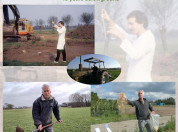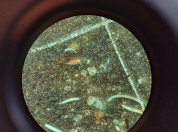Search
Filter by
Type
Tags
Dossiers
Themes
Departments
Active filters
22 search results
Search results
-
National Growth Fund finances Dutch Holomicrobiome Institute
The government of the Netherlands has allocated €200 million from the country’s National Growth Fund for a public-private consortium that will conduct research into 'microbiomes' and economically interesting applications thereof. In the consortium, NIOO is partnering with ten Dutch universities, five university-medical centres, four universities of applied sciences, many other knowledge organisations and together with dozens of small and large companies and societal organisations.
-
From Pioneer to Soil Prophet: 40 years belowground - Farewell symposium Wietse de Boer
On Thursday April 4 we'll have the Farewell Symposium and reception for our long-time colleague Prof. Dr Wietse de Boer (Department of Microbial Ecology at NIOO and Wageningen University).
-
Greenhouse gases
Climate change is amplified by greenhouse gas emissions. At NIOO, we work on the fundamental understanding of how gases such as methane, carbon dioxide and nitrogen dioxide influence ecosystems. Our knowledge of carbon and nitrogen cycles provides insight into the potential of greenhouse mitigation tools. In a Dutch freshwater lake or the soil of a tropical rain forest.
-
Book presentation on Water farming
On Friday afternoon 29 September, a new book about Water farming will be presented at NIOO. NIOO scientists Ellen Weerman and Ellen van Donk are two of the editors, and you are very welcome to join. The presentation will be in Dutch.
-
Follow-up funding for microbial fight against parasitic weed in Africa
Can micro-organisms in the soil help the fight against parasitic weeds in Africa? That question launched Promise six years ago. After promising initial results, the Bill & Melinda Gates Foundation has now awarded follow-up funding to the project.
-
Big NIOO Open Day: How does nature work?
Saturday 7 October will mark NIOO's first big Open Day since 2019. Everyone is welcome!
-
Soil biodiversity analysis for sustainable production systems (SoilProS)
SoilProS will interpret big data on soil biodiversity, soil chemical and physical characteristics with respect to current and desired soil functions, and how to use this information in order to help farmers predicting which crop varieties, seed mixtures, (organic) fertilizers, soil inocula, and organic substrates enhance the environmental sustainability of their activities.
-
Is agroforestry the answer for rainforest restoration?
The conversion of Amazon rainforest for agriculture has led to deforestation and soil degradation. Agroforestry has been suggested as a sustainable alternative, but NIOO's Eiko Kuramae says its impact on the soil needs to be more fully considered.
-
Spotlight on living soil at COP15 biodiversity conference
The UN Biodiversity Conference in Montreal (COP15) is discussing global action to reverse biodiversity loss. Healthy, living soil is of key importance.
-
Discovering methane eating mycobacterium
Join the Pint of Science lecture where Paul Bodelier and Chrats Melkonian tell us all about their recent discovery of Mycobacterium (a type of immobile, rod-shaped bacteria) that live on eating methane. Hear what we can learn from these microbes and how we can use that to tackle the issues facing methane in our atmosphere today.
